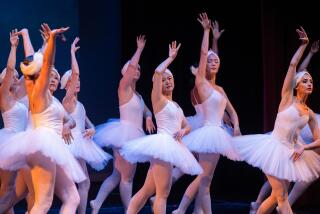BALLET REVIEW : New Principals Dim ‘Corsaire’
Don’t get me wrong. The production of “Le Corsaire” that the Kirov Ballet splashes across the stage is great fun, no matter who happens to be dancing.
This is an inspired exultation of high kitsch, complete with a picturesque shipwreck, an exotic slave auction, a hootchy-kootch harem, a corps of swashbuckling pirates, a couple of virginal ballerinas who spin like crazed tops, and macho heroes who fly through the air with varying degrees of ease. The capacity audience at the Orange County Performing Arts Center loved it on Wednesday.
A new set of principals on this occasion left one yearning, however, for the cast that had introduced the sprawling, shamelessly hokey, awfully wonderful saga to Southern California the night before. All that glitters isn’t golden, even if it comes from Leningrad.
To be sure, the second “Corsaire” crew worked diligently and scored the basic points. But it lacked finesse.
As Medora, the abducted Greek maiden who always travels with a trunkful of classical tutus, Yulia Makhalina had to compete with the dewy-fresh memory of Tatiana Terekhova in the same role. Terekhova isn’t an enviable act to follow.
A senior ballerina at the ripe old age of 37, she happens to be a nonchalant virtuosa, a knowing stylist and a subtle actress. She is irresistible.
Makhalina, only 21, is undisputably promising. Wide-eyed, round-faced, generously proportioned, she enjoys the obvious advantage of youthful exuberance, and she already knows how to command the stage.
Her technique, however, still seems a bit shaky. She often phrases in jerks, and she wavers in the great climactic challenges.
Wisely, perhaps, she didn’t attempt the double fouette turns in what we used to think was the grand pas de deux (here it is a bizarre pas de trois). And where her illustrious predecessor had made a noble attempt at logical characterization--she gazed adoringly at the corsair hero, for instance, but only politely at his slave--Makhalina contented herself with a permanent all-purpose smile.
Eldar Eliev as Conrad, the would-be protagonist, loomed heroically over the rest of the cast. He danced broadly, strenuously and untidily. Although he partnered the ballerina sympathetically, nature may have destined him to be a character specialist rather than a cavalier.
Irina Chistiakova was promoted from erstwhile Odalisque duty to the perpetual soubrette maneuvers of Gulnara, the “other” Greek maiden. Dancing crisply, cutely and with tremendous security, she surmounted the choreographic hurdles with ease, though she lacked the winsome charm that Elena Pankova had brought to the role on Tuesday.
On Wednesday, not incidentally, Pankova took her turn in the ranks of the junior ballerinas gracing the exquisite Odalisque trio. Her beguiling associates were Veronica Ivanova and Zhanna Ayupova.
Igor Petrov, slender, crusty and nicely mock-nasty as the slave merchant Isaac Lankedem, danced his share of the celebrated “Pas d’Esclave” with neat brio. Dmitri Korneyev returned as Birbanto, the lusty mutineer, and this time both his muskets fired on cue. Gennadi Borchenko again bumbled amiably as the gullible pasha.
Farukh Ruzimatov repeated his wondrous look-at-me-I’m-a-heartthrob number as the smoldering slave, Ali.
Victor Fedotov again conducted the motley junk music with elan, and the Pacific Symphony responded to his urgings with suave bravado. Endre Granat contributed an exquisite violin solo in the slave-market duet, and Mindy Ball made the most of the recurring harp orgies.
More to Read
The biggest entertainment stories
Get our big stories about Hollywood, film, television, music, arts, culture and more right in your inbox as soon as they publish.
You may occasionally receive promotional content from the Los Angeles Times.










